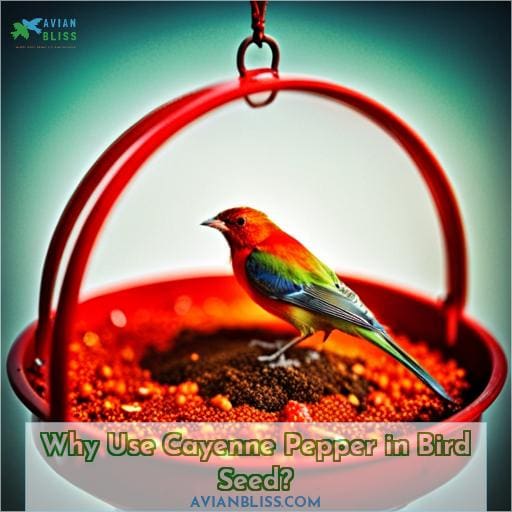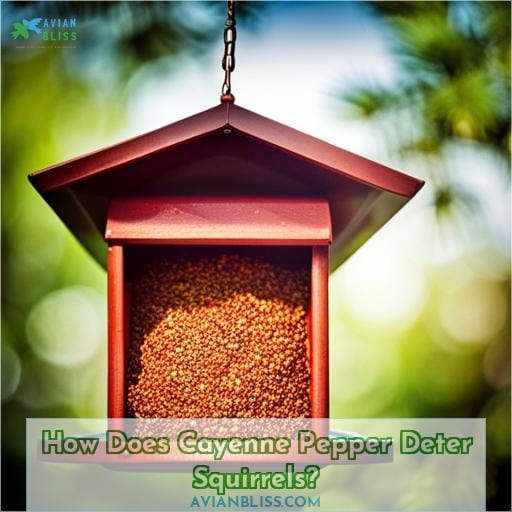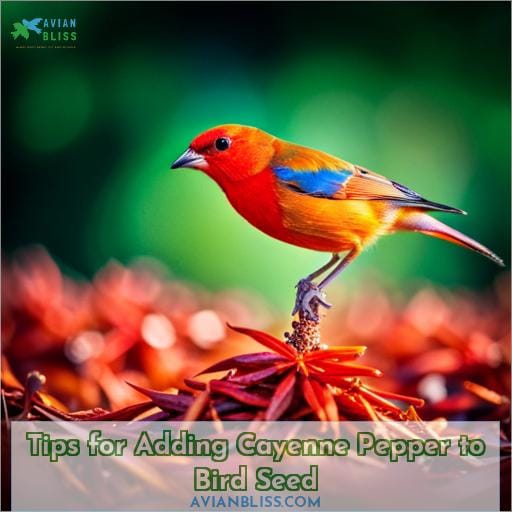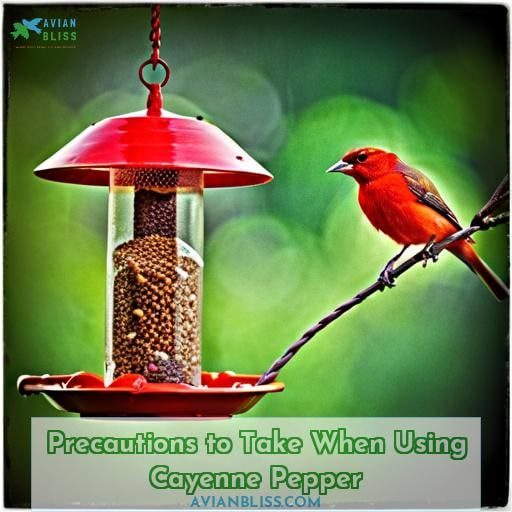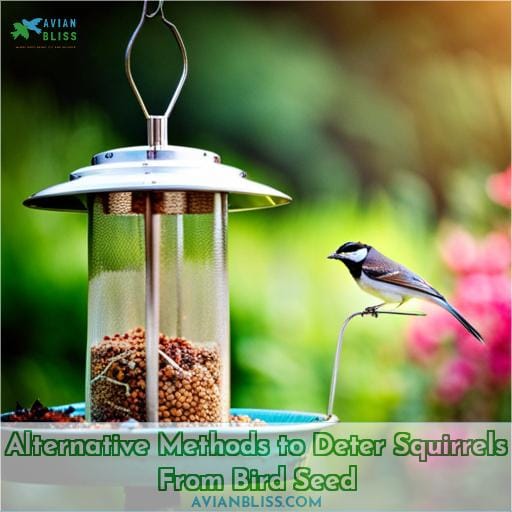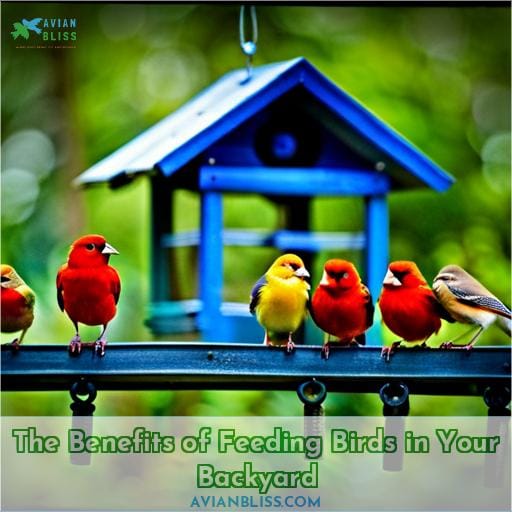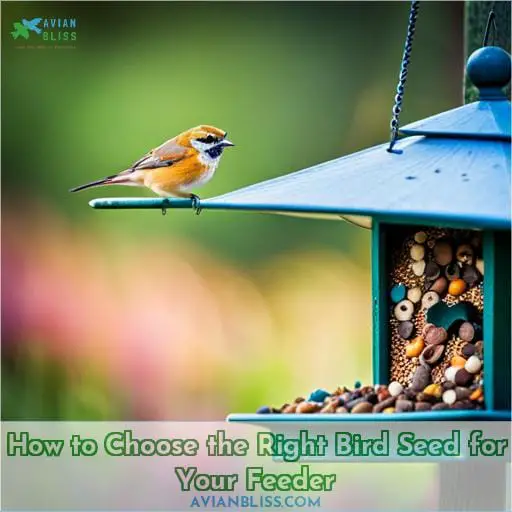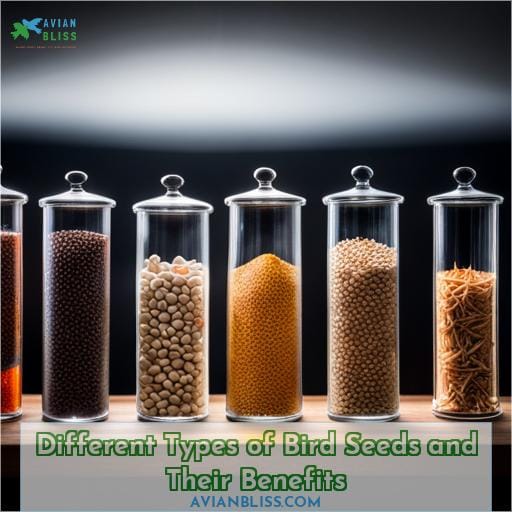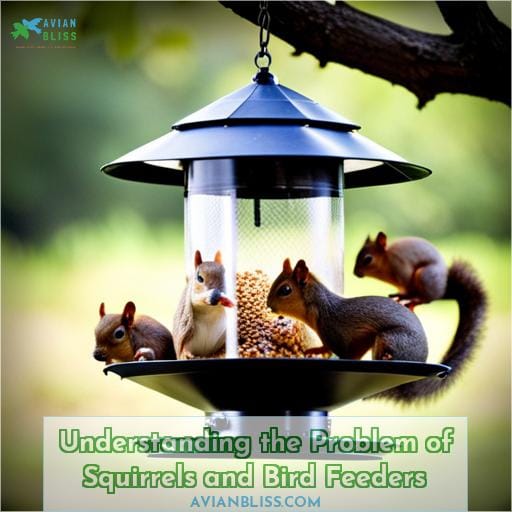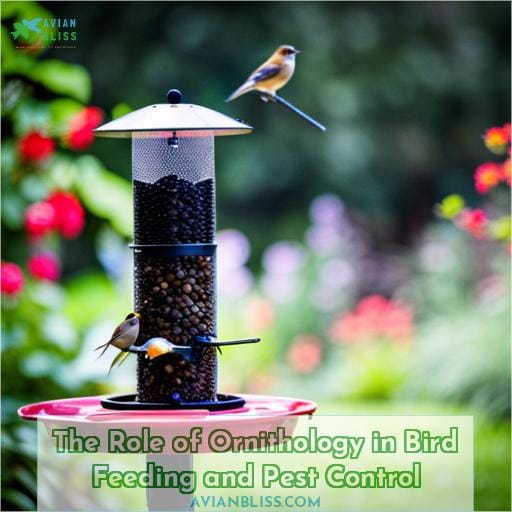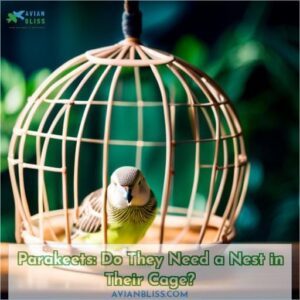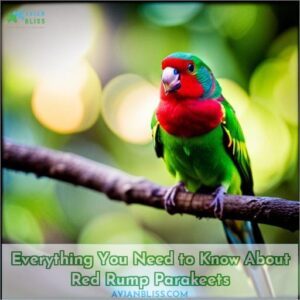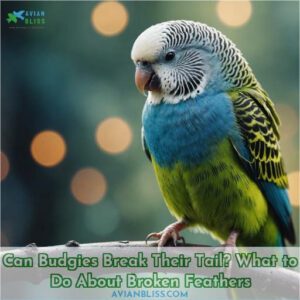This site is supported by our readers. We may earn a commission, at no cost to you, if you purchase through links.
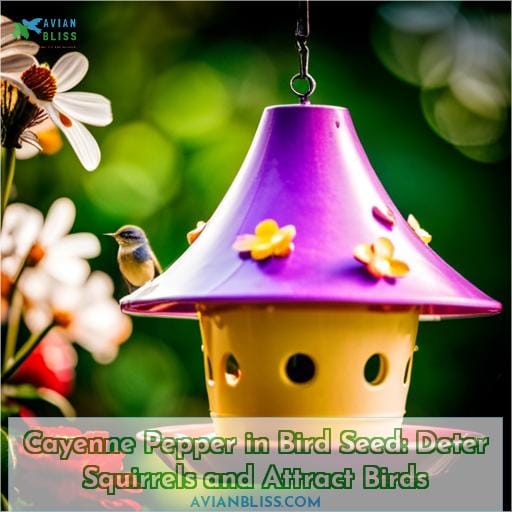 When it comes to your backyard birds, the struggle against pesky squirrels can feel like a losing battle. However, there may be an answer out there that could tip the scales in favor of our feathered friends: cayenne pepper! Sprinkling this fiery spice into bird seed is thought to deter those clever critters from stealing all the food.
When it comes to your backyard birds, the struggle against pesky squirrels can feel like a losing battle. However, there may be an answer out there that could tip the scales in favor of our feathered friends: cayenne pepper! Sprinkling this fiery spice into bird seed is thought to deter those clever critters from stealing all the food.
So what’s preventing you from trying it? Continue reading for tips on adding cayenne pepper to bird seed and alternative pest control methods.
Table Of Contents
- Key Takeaways
- Why Use Cayenne Pepper in Bird Seed?
- How Does Cayenne Pepper Deter Squirrels?
- Tips for Adding Cayenne Pepper to Bird Seed
- Precautions to Take When Using Cayenne Pepper
- Alternative Methods to Deter Squirrels From Bird Seed
- The Benefits of Feeding Birds in Your Backyard
- How to Choose the Right Bird Seed for Your Feeder
- Different Types of Bird Seeds and Their Benefits
- Understanding the Problem of Squirrels and Bird Feeders
- The Role of Ornithology in Bird Feeding and Pest Control
- Conclusion
Key Takeaways
- Cayenne pepper can be used to deter squirrels from birdseed.
- It irritates squirrels’ mouths and causes discomfort.
- Gradually increase the amount of cayenne pepper used.
- Thoroughly mix the birdseed before filling bird feeders with the pepper-infused mixture.
Why Use Cayenne Pepper in Bird Seed?
You’ll add a dash of cayenne pepper to your birdseed mix because the spicy kick deters greedy squirrels yet still entices sweet songbirds. Cayenne pepper benefits backyard bird feeding by irritating squirrels’ sensitive noses while remaining harmless to your feathered friends.
This red hot squirrel repellent boosts your birdseed blend into an exquisite banquet that nourishes chickadees yet torments thieving tree rodents.
Stir in a dash of chili pepper for your bird buffet as a brilliant bird feeding tip straight from wildlife friendly gardening guides. Embrace the fiery side of birdwatching to safeguard your birdseed’s bounty for blue jays and cardinals rather than letting it fall into conniving squirrel paws.
Your yard will become a winged wonderland once squirrels abandon your feeders thanks to this crafty addition.
How Does Cayenne Pepper Deter Squirrels?
The pungent, flaming red Cayenne spices up seed to unpleasantly tongue-torch squirrels away.
- Triggers pain receptors in squirrels’ mouths
- Causes a burning sensation on contact
- Squirrels associate the burning with the birdseed
- Seek alternative food sources without spice
- Eventually avoid spicy seeds altogether
Cayenne pepper introduces an unpleasant sensory experience for squirrels interacting with treated birdseed. The spicy heat activates pain receptors in squirrels’ mouths, causing a burning feeling when they try to eat.
This conditions squirrels to associate the unpleasant burning with the spiced birdseed, driving them to seek out alternative food sources without pepper. Over time, squirrels learn to avoid birdseed mixes containing Cayenne pepper altogether.
Tips for Adding Cayenne Pepper to Bird Seed
Stir a pinch of cayenne pepper into your birdseed mix before filling the feeder. This natural squirrel deterrent enhances backyard bird feeding benefits while modifying your seed mix.
- Start with a small amount and increase gradually. Too much can irritate birds‘ eyes.
- Mix thoroughly to distribute evenly before filling feeders.
- Replenish often, as squirrels may become accustomed over time.
- Monitor feeding activity and adjust pepper dosage as needed. More may be required in fall when squirrels are active.
Ornithology experts advise thoughtful use of squirrel deterrents like cayenne pepper to promote healthy bird feeding habits. Evaluate risks, research alternatives, and observe effects when modifying your birdseed mix.
Precautions to Take When Using Cayenne Pepper
You’d be wise to use care when spicing up your feed, lest the pepper’s bite bring tears to innocent eyes. While cayenne pepper can deter pesky squirrels, it’s not ideal for all birds. Start with smaller doses to gauge your feathered friends’ tolerance.
Check often that ground-feeding birds like doves aren’t suffering irritated eyes or skin from stepping in spiced debris.
Consider squirrel baffles or modifying your seed mix over liberal cayenne coating. Squirrels may grow accustomed to the burn, yet spice never loses its sting for sensitive species. With thoughtful preparation and vigilant monitoring, cayenne pepper can assist your squirrel baffle in protecting your feeders without harming valued avian visitors.
There are wildlife-friendly options for outsmarting these clever pests without resorting to extreme spice.
Alternative Methods to Deter Squirrels From Bird Seed
Instead of using cayenne pepper, you can take some alternative approaches to deter squirrels from your birdseed. Construct a better bird feeder that squirrels can’t access, or modify the composition of your birdseed mix itself.
Construct a Better Bird Seed Feeder
Instead of fretting over critters getting your birdseed, remake your feeder design for the feast you envisioned.
- Perch-proof your setup.
- Fortify with predator guards.
- Mount on smooth poles.
- Choose smaller seeds like nyjer.
- Offer hummingbird nectar.
Invest in feeder innovations for the bird splendor you aim to see.
Modify the Composition of Bird Seed Mix
Slather some white millet and safflower in your bird feeder to entice bluebirds while putting grackles in a tizzy. Squirrels shun certain seeds while birds relish them. Safflower, nyjer, and millet lure the desired colorful company without baiting the furry freeloaders.
Tailoring feeder perches also welcomes petite birds yet discourages bulky hijackers. With thoughtful provisions and feeder adjustments, avian adventures need not be spoiled by rascally rodents. We can peacefully coexist with little compromise, reveling in nature’s feathered spectacle.
Avoiding Harm to Birds and Other Wildlife
Instead of using hot pepper flakes, which can harm birds’ eyes, there are some safer options to deter squirrels from bird feeders. Put up physical barriers like dome baffles or exclusion-type feeders that block squirrel access.
Provide separate places for squirrels, like a dedicated feeder with corn. Use raw safflower or nyjer thistle seed which squirrels generally avoid, rather than mixed birdseed with millet that attracts them.
Transitioning now to the next subtopic on installing physical barriers on bird feeders. Let’s explore some options like domes, baffles, and feeder placement that make it harder for squirrels to reach the bird food while still allowing birds to access it.
The Benefits of Feeding Birds in Your Backyard
Attracting birds to your backyard with feeders and native plants can bring you enjoyment while also promoting ecological balance. Providing food, water, and shelter will attract diverse, beautiful bird species that you can observe up close, as their presence helps control insects and weeds.
Attracting diverse bird species
You’ll draw in more bird species with a nourishing blend like Pine Tree Farm’s fruit berry nut logs. Attract sparrows by providing seed variety. Mix millet, safflower, sunflower seeds, fruit, and nuts to nurture diversity.
Vary feeder types and locations to allow access for different behaviors and sizes. Consider squirrel behavior when positioning. With thoughtful bird feeding, your backyard can flourish with nature’s feathered friends.
Promoting ecological balance
Fauna flourishes when fostering balance in its habitat. Preserving ecology allows biodiversity to thrive. Sustainable practices cultivate wildlife conservation as we harmonize with the ecosystem. Nature’s balance depends on our mindful stewardship. through compassionate coexistence allows nature to prosper.
Mindfully coexisting with the environment sustains biodiversity. Our thoughtful stewardship of the planet promotes ecological harmony. Sustainable living nourishes wildlife conservation efforts. Thoughtful coexistence sustains ecological balance.
Providing winter survival aid
While frost nips your nose, offering suet cakes tempts hungry chickadees.
- Chickadees and nuthatches depend on offered energy-rich foods during harsh winters.
- Containing calories and fat, suet provides essential nourishment for their survival.
- Positioning suet cages to shelter from heavy snow keeps treats accessible.
As winter descends, extending a helping hand fosters backyard birds through the leanest months.
How to Choose the Right Bird Seed for Your Feeder
When choosing bird seed for your feeder, it’s important to consider the nutritional requirements of different bird species. Researching which seeds attract the types of birds you want to see can help you develop a custom seed blend.
Ultimately, tailoring your seed selection and using seed types such as nyjer, safflower, and millet will allow you to successfully attract specific backyard birds. Varying the types of seeds in your blend provides essential nutrients and entices many species to visit your yard.
Focusing on high-quality seeds that match birds’ natural diets supports their health while they enjoy your feeder.
Nutritional Requirements for Birds
Bone up on which seeds and grains offer the fats, proteins, and carbohydrates birds need. Sunflower and safflower seeds are packed with protein and fat for energy. Finches favor nyjer seeds for their high fat content.
Small songbirds require calcium-rich grit. Black oil sunflower seeds attract the greatest variety of birds. Avoid cheap filler seeds like milo and wheat. Research bird diets and purchase high quality seed mixes.
Attracting Specific Bird Species
And you, fair seeker, might discover spice is not so nice for our feathered friends’ eyes.
To attract specific species to your yard, consider their migration patterns, preferred habitats, and specialized feeder designs. Observe patience and care, for the birds are wild and free. With wisdom and compassion, bird watching becomes an act of liberation.
Avoiding Harmful Ingredients
You’ll need to be cautious with hot pepper deterrents, as they may irritate birds’ eyes. Seek squirrel solutions that keep backyard wildlife safe. Pet-friendly, non-toxic alternatives exist, from feeder designs to seed blends.
With thoughtful gardening, you can find bird-safe deterrence. Look to non-spicy blends, exclusion feeders, and distraction techniques.
Different Types of Bird Seeds and Their Benefits
Many backyard bird enthusiasts wonder if adding cayenne pepper to birdseed will deter pesky squirrels. When choosing birdseeds, consider black oil sunflower seeds for cardinals, striped sunflower seeds for finches, safflower seeds for chickadees, dried corn for jays, and peanuts for woodpeckers.
The right mix will attract the species you want to feed while discouraging unwanted critters.
Black Oil Sunflower Seeds
You’d find black oil sunflower seeds are a favorite for their high fat content, providing birds with needed energy during cold weather. Choose these popular seeds for feeding various birds such as cardinals, doves, jays, and finches.
Their thin shells make them easy for small birds to open. Place black oil seeds in tube or hopper feeders to attract the most species to your backyard refuge. Prioritize feeder placement near brush piles or trees to support birds’ natural feeding habits.
Striped Sunflower Seeds
Nuh uh! A handful of those seed casings packs lots more punch than black oil so fill up your tray and cheer on the backyard feastings. Striped sunflower seeds offer similar nutrition but have thinner shells. They also store longer as the thicker hull of black oil seeds can go rancid quicker.
Squirrels tend to pick out the meaty black oil first, leaving more striped treasures for chickadees, finches and cardinals. With creative feeder design, like adding hot pepper powder, you can steer those bushy tails clear of the goods.
Safflower Seeds
You’ve gotta grab some safflower seeds since those smaller shells appeal to songbirds yet repulse squirrels. Best for cardinals and chickadees, these seeds contain healthy fats and oils for energy. Store safflower properly to prevent rancidity. Ranging from $20-40 per 40-pound bag, it’s costlier yet widely available.
Target finicky finches with white safflower. Blend safflower with other seeds like black-oil sunflower to stretch your budget.
Dried Corn
Attract a wider variety of desirable backyard birds by offering dried corn, especially favorable for ground-feeding species like doves, juncos, towhees, and sparrows. Dried corn is an affordable option that brings in more species while deterring squirrels.
Scatter it on the ground or mix with other seeds in feeders. Avoid overfeeding corn, as it offers limited nutrition. Consider pairing it with nutritious seeds or suet. With some creativity, you can engage more bird species without inviting squirrels.
Peanuts
You can roast peanuts at home to make a tasty, protein-rich addition to your birdseed mix that blue jays and woodpeckers love. Squirrels may initially be attracted to the aroma of roasted peanuts. Utilize diversion tactics, like suet cakes with chili pepper, to redirect squirrels.
Handling hot sauces requires care when mixing them into seed. Alternatively, consider using spices like cayenne to deter squirrels without harming birds.
Understanding the Problem of Squirrels and Bird Feeders
As the leaves turn colors and fall, signaling the arrival of autumn, so too does nature’s furry acrobat return to steal your birdseed. Squirrels will become relentless in their quest for food. They will exhibit impressive acrobatic skills and problem-solving abilities to access your carefully crafted bird feeders.
- Invest in squirrel baffles and hang them correctly to create a barrier.
- Offer alternative food sources to distract squirrels away from bird feeders.
- Explore squirrel-proof bird feeder options and styles.
- Use spicy suet cakes cautiously to deter squirrels but not harm birds.
- Try seed logs but consider more eco-friendly packaging.
With some creativity and perseverance, you can find effective, humane ways to deter squirrels and protect your bird buffet for feathered friends to enjoy. Stay vigilant, as squirrels continue their relentless quest for food as winter approaches.
The Role of Ornithology in Bird Feeding and Pest Control
When it comes to protecting backyard birds, we must consider the role of ornithology research. Studying bird behavior provides crucial insights that inform effective, ethical pest management. By understanding squirrel habits and psychology, ornithologists help identify humane solutions.
Their findings guide wildlife-friendly feeder design and feeding practices. With science as our guide, we can deter squirrels without harming songbirds or other animals.
Thoughtful pest control considers impacts on local ecosystems. It’s our responsibility as stewards of the natural world to heed the counsel of avian experts. When navigating the complexities of backyard bird feeding, let’s look to ornithology to illuminate the wisest path.
With care and compassion for all creatures great and small, our yards can become havens of harmony.
Conclusion
It’s estimated that nearly 7 million wild birds die each year from window collisions, making it the second leading cause of death. As such, it’s important to protect birds from other dangers – like squirrels. Cayenne pepper can effectively deter squirrels when added to bird seed, as it repels squirrels while attracting birds.
Used responsibly, cayenne pepper can help you feed birds without worrying about pesky squirrels.
However, if you’d rather take an alternative approach to deterring squirrels, you can modify your bird seed mix, construct a better bird feeder, or use exclusion-type feeders. Ultimately, you’ll want to provide the right kind of bird seed for your feeder to attract the birds you want while keeping squirrels away.

